It’s movie time in the Bluff City. The Indie Memphis Film Festival, now in its 22nd year, opens on several screens October 30th and runs through November 4th. Executive Director Ryan Watt says more than 12,000 people attended last year’s festival, and he expects this year to be bigger. “Ticket sales this year are way ahead of the past,” he says. “Someone made a comment that hopefully other people agree with, but it was pretty much my dream feedback: They said, ‘This is one of the few events in Memphis that actually gets better as it gets bigger.’ What I hope is that we grow organically, but it doesn’t mean you lose out on the important things.”
After opening night at Crosstown Theater, the festival moves to Overton Square, where Cooper Street will be blocked off for a giant, three-day block party under a big tent that will serve as home base for screenings at Playhouse on the Square, Hattiloo Theatre, and Malco Studio on the Square. There will also be industry panels and special events, such as the Black Creator’s Forum and Pitch Rally, where African-American filmmakers compete for a $10,000 grant to get their Memphis-based film off the ground.
The “important thing” Watt wants to be sure to preserve about Indie Memphis is encapsulated in its motto: “Film For All.” For most of the dozens of feature films presented during the festival, this will be the only opportunity to see them on the big screen in Memphis. The person responsible for choosing the films is Artistic Director Miriam Bale. “I’m always looking for films that keep me engaged and surprise me in some way,” she says. “I feel like we stand out to some people for having more films directed by POC or women filmmakers, and it always catches me off-guard when people ask about that. It seems the real question is why are other film festivals dominated by white men? It just feels fresh and well-balanced to have a variety of perspectives and styles.”
Here are a few notable films to catch at Indie Memphis 2019. For continuing coverage of all of the great stuff we didn’t have room for in print, be sure to visit the Memphis Flyer website for daily updates.
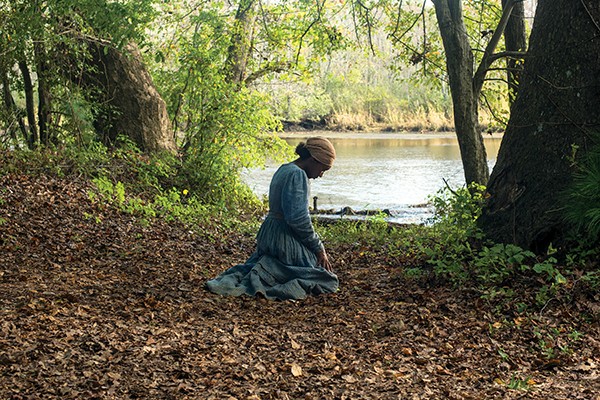
Harriet
… … … … … …
Harriet
“You are money to them,” says Rev. Samuel Green (Vondie Curtis-Hall) to Harriet Tubman (Cynthia Erivo) as he preps her for her escape from slavery in the opening act of Harriet.
The timing of this year’s Indie Memphis was fortunate for director Kasi Lemmons’ new biopic of the abolitionist hero. It opens the festival at Crosstown Theater on Wednesday, October 30th, before going into wide release on Friday, November 1st.
Rev. Green’s precarious position as a free black man in 1849 Bucktown, Maryland, serves to introduce the tensions of pre-Civil War America, as the debate over slavery was slowly heating to a boiling point. We first meet him ministering to the slaves on the Brodess farm. Under the watchful eye of masters Edward (Mike Marunde), Eliza (Jennifer Nettles), and Gideon (Joe Alwyn), the Reverend preaches to his flock that God has made servitude their lot in life. But his church is a stop on the Underground Railroad, and he tells Tubman, “Fear is your enemy. Follow the North Star.”
Deception, divided loyalties, and fear pervade the atmosphere of Harriet. Lemmons and writer Gregory Allen Howard are at their best when Tubman is on the run. Her initial flight to freedom, pursued by Gideon Brodess and a pack of snarling slave catchers, is a masterfully designed chase sequence that ends on a picturesque bridge, simultaneously providing an early climax and setting up dramatic moments later in the film. It is no small irony that Harriet makes such good use of the cinematic tools which held 1915 audiences in thrall to D.W. Griffith’s notoriously racist The Birth of a Nation.
Cynthia Erivo takes on the challenging title role with grace and focus. We first meet her lying unconscious in a field from a seizure, which she suffers with after an overseer gave her a head injury as a child. Called “Minty” by her masters, she chooses to become Harriet after she is encouraged to take a new name by Marie Buchanon (Janelle Monáe), a free black Philadelphian hotelier who takes in Harriet after her escape. Lemmons and Howard frame Tubman, who would come to be called Moses by slaves yearning for freedom, as a kind of Joan of Arc figure — an unlikely young liberator who leads by divine inspiration. Harriet is a by-the-numbers heroic biopic that takes few cinematic chances while trying to balance its subject’s emotional life with her exploits as a flintlock-toting action hero. The result is a crowd-pleaser that feels long overdue.
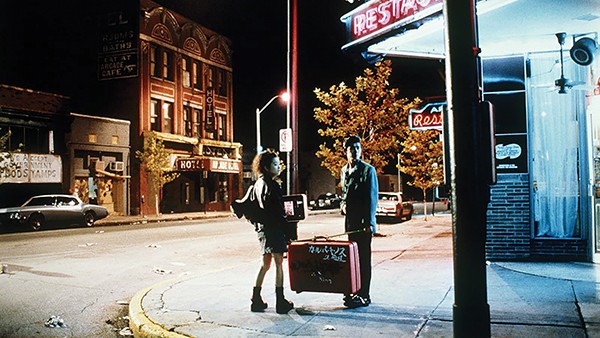
Mystery Train
… … … … … …
Mystery Train
Director Jim Jarmusch is one of the founding fathers of the independent film movement. In 1988, the auteur came to Memphis to create Mystery Train. The film’s four parallel stories, which all happen over the course of one eventful night on South Main, begin with “Far From Yokohama.” Music-worshipping couple Mitsuko (Yuki Kudo) and Jun (Masatoshi Nagase) visit Memphis to see firsthand the place where blues, rock, and soul were born.
Upon the film’s release in 1989, Jarmusch told Interview magazine why he chose to set his film in the Bluff City, which he had never visited. “If you think about tourists visiting Italy, the way the Romantic poets went to Italy to visit the remnants of a past culture, and then if you imagine America in the future, when people from the East or wherever visit our culture after the decline of the American empire — which is certainly in progress — all they’ll really have to visit will be the homes of rock-and-roll stars and movie stars. That’s all our culture ultimately represents. So going to Memphis is a kind of pilgrimage to the birthplace of a certain part of our culture.”
The cast is stacked with musical legends. Screamin’ Jay Hawkins stars as the desk clerk at the hotel where the characters’ lives intersect. Rufus Thomas makes a memorable cameo early in the film. Joe Strummer’s brief career as an actor peaked here, with the Clash frontman playing scenes with a pre-fame Steve Buscemi. Tom Waits, already a Jarmusch veteran from Down by Law, provides the voice of the unseen radio DJ who sets the film’s eerie mood.
Mystery Train is not only a great watch and hugely influential — Pulp Fiction would build on its inventive story structure four years later — but it is also a window into the vanished past of Downtown Memphis.
Jarmusch will be in attendance on Saturday, November 2nd, when Mystery Train screens at Playhouse on the Square at 6:30 p.m. There will be an encore screening on Thursday, November 7th, at the Malco Powerhouse theater, which is located in the South Main neighborhood where Mystery Train was filmed.
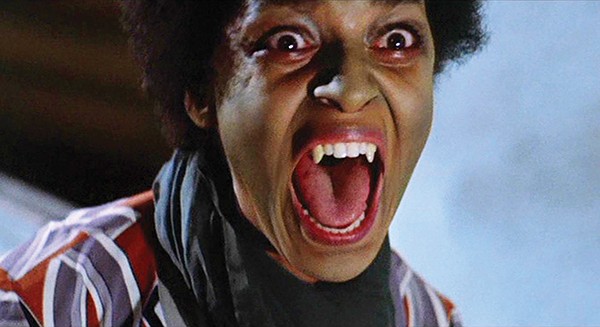
Blacula
… … … … … …
Halloween Hijinx
Halloween falls during Indie Memphis this year, and the festival has responded by programming some appropriately spooky fare, such as Jim Jarmusch’s latest picture The Dead Don’t Die. Jarmusch’s entry into the small but growing zombie comedy subgenre stars Bill Murray, Adam Driver, and Chloe Sevigny as small-town police officers faced with a plague of ghouls. The cast includes Tilda Swinton, Tom Waits, Danny Glover, and — in a joint cameo with Iggy Pop — Sara Driver.
Driver is Jarmusch’s longtime producer and partner. Indie Memphis is devoting screens to a retrospective of her work, including her 2017 documentary Boom for Real: The Late Teenage Years of Jean-Michel Basquiat, and her surreal fantasy from 1986, Sleepwalk. Driver was also asked to recommend some of her favorite horror classics for the festival. She chose Cat People, Jacques Tourneur’s timeless 1942 black-and-white masterpiece (Saturday, November 2nd, 11 a.m.); and Kuroneko (Black Cat), a 1968 film from director Kaneto Shindo which dazzles with its black-and-white cinematography and presages the psychological Japanese horror of today (Saturday, November 2nd, 11:40 p.m.).
Showing on Halloween proper is Blacula. Part of the blaxsploitation wave of the 1970s featured in Craig Brewer’s Dolemite Is My Name, the film stars the 6’5″ William Marshall, a serious stage actor who was lauded for his Broadway portrayal of Othello, as Prince Mamuwalde, African royalty transformed into a vampire after an ill-fated encounter with Count Dracula. It was the first-ever onscreen portrayal of a black vampire, and the bloodsucker takes time out from stalking the reincarnation of his late wife Luva (Denise Nicholas) to take revenge on some familiar blaxsploitation villains before dying for real this time as a tragic anti-hero. (Playhouse on the Square, Thursday, October 31, 6:30 p.m.).
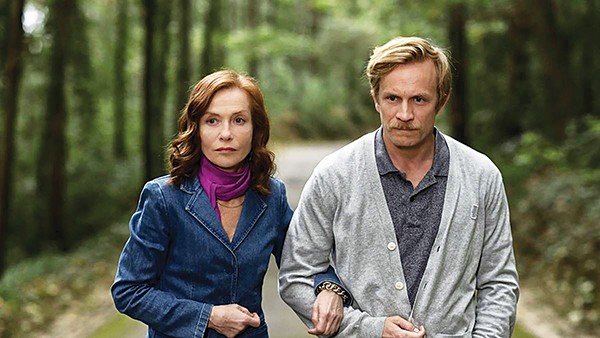
Frankie
Frankie
Ira Sachs has always been a fine observer of people. What makes the Memphian’s films so compelling are the exquisitely rendered characters. Rip Torn’s self-destructive record producer in Sundance-winner Forty Shades of Blue, John Lithgow and Alfred Molina’s cozy, lifelong lovers in Love Is Strange, and the families caught up in New York’s class conflict in Little Men could have only come from the mind of Sachs.
Isabelle Huppert’s layered performance in Frankie (Sunday, November 3rd, 4:15 p.m.) is the latest in that long line of beautifully conceived protagonists. The title character is a successful actress whose cancer prognosis is not good. She gathers all of her extended family together for one last vacation to make some good memories and say goodbye. But while she may have intended the trip to be an opportunity to tie up loose ends, her family has other ideas. “My experience in the last few years of being close to illness has been so surprising because I realize so many other things are always happening at the same time,” says Sachs. “You can’t just focus on the end. Simultaneously, there is every other genre of life taking place. … You know, it’s funny because I’m coming to Memphis for a family reunion on the weekend when I show the film at the Indie Memphis festival. If 35 people show up for a family reunion, there are 35 different stories being told.”
Sachs says he designed the character for the prolific French actress. “She had written me after seeing Love Is Strange. She really responded to it. I got to know her, and I felt like I could really write for her and her voice. I also encouraged her to be as simple as possible with the material — meaning, I wanted her to reveal as much of her own self as she could through the character.” It was Sachs’ longtime writing partner Mauricio Zacharias who suggested setting the story in Portugal. The lush countryside and wide beaches of the small coastal town outside of Lisbon where Frankie’s family gathers gives Sachs his most beautiful setting yet. “There’s something magical about the place, and that’s something we played with. In the bright summer light, there are no shadows, so there’s no place for people to hide. Almost 80 percent of the film is outdoors, and so people are exposed, which is often the case when you’re traveling and you can’t really just go into your own home and hide out. You are alone with your fellow travelers and with nature.”
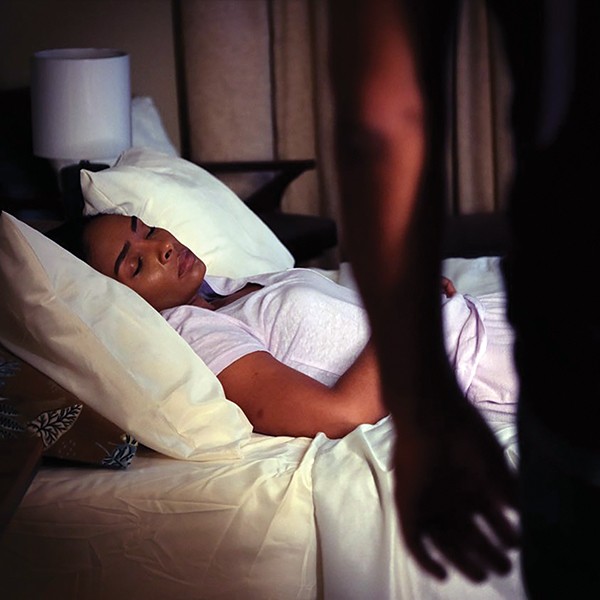
No Ordinary Love
… … … … … …
No Ordinary Love
Indie Memphis has always championed first-time filmmakers. Chyna Robinson got the opportunity to make her first feature No Ordinary Love (Saturday, November 2nd, 10:30 a.m.) after her short film, “Greenwood: 13 Hours,” garnered 23 awards on the festival circuit. “My executive producer, Tracy Rector, is the chair of the board for a women’s shelter and service provider in Fort Worth, Texas,” she says. “She approached me and asked if I would be interested in making a film about intimate partner violence and domestic violence, and I jumped at the opportunity.”
No Ordinary Love tells the story of two women, Elizabeth (April Hartman), the wife of a pastor (Eric Hanson); and Tanya (DeAna Davis), the wife of a policeman (Lynn Andrews III). When Elizabeth, a counselor at her husband’s church, notices that Tanya has a black eye, she starts asking questions about how it happened, only to discover that the only thing the church authorities are interested in is whether or not the wife is submitting to her husband. The two women at first believe they only need to work harder at loving their husbands, only to find themselves sinking deeper into cycles of abuse that become life-threatening.
Robinson says it was important to her to get the details right. “I was able to speak with the volunteers at SafeHaven of Tarrant County and look at some of the warning signs. … I wanted to make sure to include that. I was able to speak with 23 women survivors of domestic abuse and intimate partner violence, just to get inside of the thought process and emotional part of it all, because I had not been in an abusive relationship, and there were things that I didn’t know and didn’t understand and things that statistics won’t tell you. I wanted to make sure that I was able to speak to people who had actually gone through it to understand how the cycle of of abuse really works.”
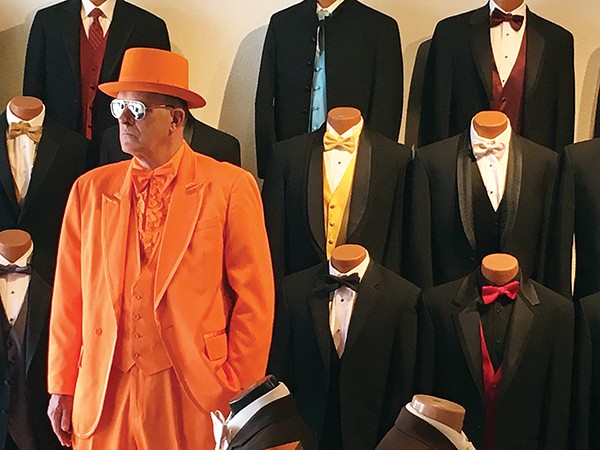
Best Before Death
… … … … … …
Best Before Death
As a musician and producer, Bill Drummond was responsible for some of the strangest British pop music of the 1980s and 1990s. He was a member of punk provocateurs Big In Japan and produced the first Echo and the Bunnymen album. In the early 1990s, he found unexpectedly huge success with partner Jimmy Cauty in the electronic group known variously as the Justified Ancients of Mu Mu, The Timelords, and KLF. But by the mid-1990s, the one-time A&R man was so disillusioned with the music industry that he formed an art collective called The K Foundation that staged a series of increasingly elaborate and expensive pranks that culminated in piling up one million pounds’ worth of currency and setting it on fire.
Director Paul Duane had long been watching Drummond with fascination. “His exploits were legendary, and he was the kind of guy who could send a band to play in Greenland or Papua, New Guinea, just because he felt the line they were on was important,” Duane says. “I was looking for someone to make a film about someone — knowing it would be a long haul as they always are — who might be inspiring, or at least fun to spend that much time with. Reading his work, he was clearly a fellow traveler, trying to figure things out in the same way that I was, though much better than I am at finding answers or at least at phrasing the questions.”
Drummond’s latest long-term art project involved traveling around the world to various locales and performing seemingly mundane tasks, like building a bed or shining shoes, in public. Duane decided to follow Drummond with a camera, just to see what happened. “We all have things in our lives we are inexplicably attached to,” says Duane. “Bill likes baking, knitting, carpentry, shining shoes. He’s doing these things because they have meaning to him. Whether they mean anything to anyone else is secondary, really. The acts in themselves aren’t significant, but maybe the decision to make them important in his life, the conscious decision to foreground them, is what matters.”
Duane enlisted Memphian Robert Gordon as producer for Best Before Death (Friday, November 3rd, 9:30 p.m.). “I see Bill’s art as creating ephemeral communities and holding them together as long as possible,” says Gordon. “Whether it’s passers-by who become briefly engaged or the neighbors near his basecamp, he weaves a group of strangers into a fleeting tapestry, into one of those giant soap bubbles that you try to keep from bursting. Bill, of course, refuses to explain himself.”
Duane says Best Before Death is a different kind of documentary. “People laugh a lot, which is rare for a film about conceptual art, I think. It’s funny, and to some degree it’s (and I hate this phrase, but it’s been used a few times about the film) life-affirming.”
… … … … … …
Hometowners Rule At Indie Memphis 2019
From a haunted bachelor party to an essential music documentary, Memphis-area filmmakers shine at this year’s festival. — By Chris McCoy
The Indie Memphis Film Festival was founded in 1998 by Memphis filmmakers who could not find traditional outlets for their art. The festival has grown enormously in the last two decades, but it has never lost its commitment to local filmmakers, who compete in the “Hometowner” category.
This year’s batch of Memphis-made movies includes six feature films. Cold Feet (Sunday, November 3rd, 7 p.m.) is the latest from Brad Ellis and Allen C. Gardner. Ellis has been a staple of the Memphis film scene since his (literal) art house horror film The Path of Fear premiered at Indie Memphis in 2002. Gardner first teamed up with Ellis when he wrote and starred in Indie Memphis-winner Act One in 2005. Their last collaboration Bad, Bad Men appeared at Indie Memphis 2016 and is now available on Amazon Prime.
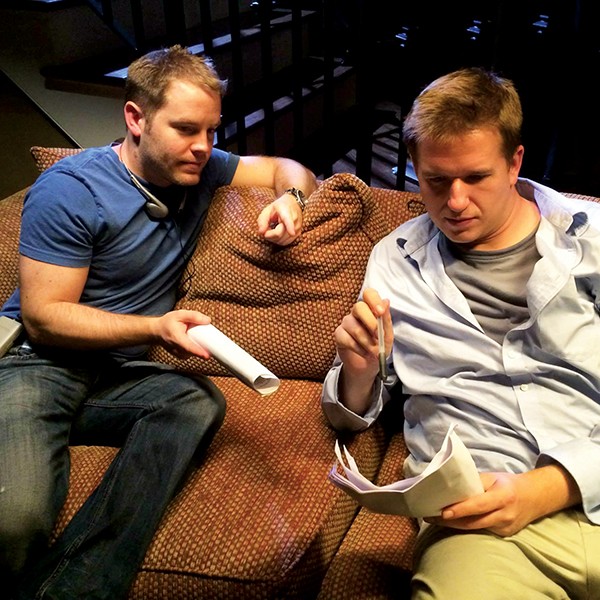
Brad Ellis and Allen C. Gardner
For Cold Feet, Ellis and Gardner got much of the crew back together from Bad, Bad Men to return to the horror genre with a comedic twist. Gardner, Nathan Ross Murphy, Adam Burns, and Gabe Arredondo return as old friends gathered for a decadent bachelor party weekend. But as fate would have it, the house they have rented is also home to a ghost or two who have their own plans. Lindsey Roberts, who starred in Craig Brewer’s premiere film The Poor & Hungry, and Annie Gaia also star.
On the other end of the cinematic spectrum is Humanité, The Beloved Community. The music documentary celebrates its subject, Memphis musician Kirk Whalum with a trip around the globe, seeking out the music that the saxophonist and minister has both been inspired by and inspired. Director Jim Hanon turns his camera on Whalum as he traces the roots of African influence through gospel, jazz, and soul and on into the larger popular music environment. The lavishly photographed film stops in Nairobi, Tokyo, and London to see Whalum play and connect with the musicians he collaborates with.
Director Jessica Chaney will premiere her debut feature This Can’t Be Life on Sunday, November 3rd, at 1:30 p.m. Chaney tapped Amanda Willoughby, who co-directed the 2018 short film “Not Your Ordinary Black Girls” about a pair of super-powered sisters who team up to help a burlesque dancer in distress, for her latest work, to edit and produce from the script by Chaney and Davida McElrath. This Can’t Be Life stars Melissa Vanpelt as Danny, Lillian Land as Cree, and Ray Simone as Jade, three longtime girlfriends navigating the ups and downs of life, careers, and love as black women in the Bluff City. The dramedy raises an eyebrow to romance and sings a paean to the power of friendship.
Jookin’ has historically been a favorite subject of Memphis filmmakers. One of Memphis’ favorite sons is profiled in Lil’ Buck: Real Swan (Sunday, November 3rd, 7 p.m.). The dancer with the uncanny ankles who grew up in poverty and translated his raw talent into the world of ballet returns home to the city he loves and traces the history of jookin’ from the Crystal Palace skating rink to national prominence. As Buck says early in the film,”We have no choice but to struggle here in Memphis.” Director Louis Wallecan combines impressive 4K cinematography with some choice archival footage.
When Los Angeles director Joe LaMattina premiered his documentary Memphis ’69 (Saturday, November 2nd, 2 p.m.) at Crosstown Theater earlier this year, the house was packed — and for good reason. The first music festival devoted to the blues was held at the Overton Park Shell in 1966. By the summer of 1969, the blues had gained wide new audiences as rock-and-roll conquered the world. A few months before Woodstock, the final Memphis Country Blues Festival was filmed by Gene Rosenthal. The film sat in Rosenthal’s basement for years until Fat Possum Records’ Bruce Watson decided to back the production. The film includes performances by Memphis legends Sid Selvidge and Lee Baker, Sleepy John Estes, and a stunning turn from a 106-year-old bluesman named Nathan Beauregard, making it a must-see documentary for anyone with an interest in the music that makes this area great.
For daily recommendations of what to watch at Indie Memphis, keep an eye on the Memphis Flyer website.